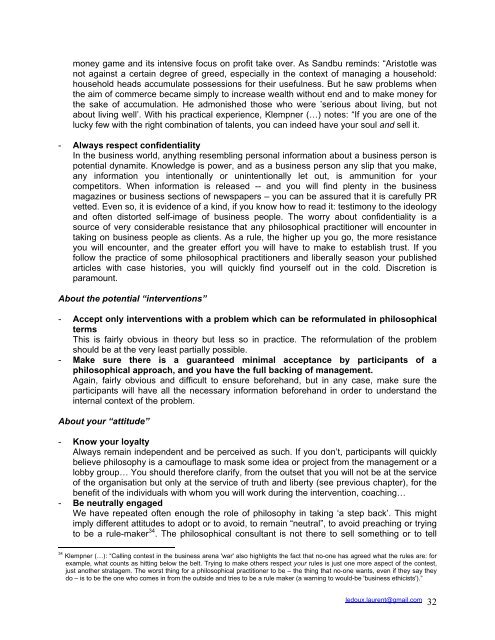Philosophy: The Managers - Philosophie Management
Philosophy: The Managers - Philosophie Management
Philosophy: The Managers - Philosophie Management
You also want an ePaper? Increase the reach of your titles
YUMPU automatically turns print PDFs into web optimized ePapers that Google loves.
money game and its intensive focus on profit take over. As Sandbu reminds: “Aristotle was<br />
not against a certain degree of greed, especially in the context of managing a household:<br />
household heads accumulate possessions for their usefulness. But he saw problems when<br />
the aim of commerce became simply to increase wealth without end and to make money for<br />
the sake of accumulation. He admonished those who were ’serious about living, but not<br />
about living well’. With his practical experience, Klempner (…) notes: “If you are one of the<br />
lucky few with the right combination of talents, you can indeed have your soul and sell it.<br />
- Always respect confidentiality<br />
In the business world, anything resembling personal information about a business person is<br />
potential dynamite. Knowledge is power, and as a business person any slip that you make,<br />
any information you intentionally or unintentionally let out, is ammunition for your<br />
competitors. When information is released -- and you will find plenty in the business<br />
magazines or business sections of newspapers – you can be assured that it is carefully PR<br />
vetted. Even so, it is evidence of a kind, if you know how to read it: testimony to the ideology<br />
and often distorted self-image of business people. <strong>The</strong> worry about confidentiality is a<br />
source of very considerable resistance that any philosophical practitioner will encounter in<br />
taking on business people as clients. As a rule, the higher up you go, the more resistance<br />
you will encounter, and the greater effort you will have to make to establish trust. If you<br />
follow the practice of some philosophical practitioners and liberally season your published<br />
articles with case histories, you will quickly find yourself out in the cold. Discretion is<br />
paramount.<br />
About the potential “interventions”<br />
- Accept only interventions with a problem which can be reformulated in philosophical<br />
terms<br />
This is fairly obvious in theory but less so in practice. <strong>The</strong> reformulation of the problem<br />
should be at the very least partially possible.<br />
- Make sure there is a guaranteed minimal acceptance by participants of a<br />
philosophical approach, and you have the full backing of management.<br />
Again, fairly obvious and difficult to ensure beforehand, but in any case, make sure the<br />
participants will have all the necessary information beforehand in order to understand the<br />
internal context of the problem.<br />
About your “attitude”<br />
- Know your loyalty<br />
Always remain independent and be perceived as such. If you don’t, participants will quickly<br />
believe philosophy is a camouflage to mask some idea or project from the management or a<br />
lobby group… You should therefore clarify, from the outset that you will not be at the service<br />
of the organisation but only at the service of truth and liberty (see previous chapter), for the<br />
benefit of the individuals with whom you will work during the intervention, coaching…<br />
- Be neutrally engaged<br />
We have repeated often enough the role of philosophy in taking ‘a step back’. This might<br />
imply different attitudes to adopt or to avoid, to remain “neutral”, to avoid preaching or trying<br />
to be a rule-maker 34 . <strong>The</strong> philosophical consultant is not there to sell something or to tell<br />
34<br />
Klempner (…): “Calling contest in the business arena 'war' also highlights the fact that no-one has agreed what the rules are: for<br />
example, what counts as hitting below the belt. Trying to make others respect your rules is just one more aspect of the contest,<br />
just another stratagem. <strong>The</strong> worst thing for a philosophical practitioner to be – the thing that no-one wants, even if they say they<br />
do – is to be the one who comes in from the outside and tries to be a rule maker (a warning to would-be 'business ethicists').”<br />
ledoux.laurent@gmail.com<br />
32
















